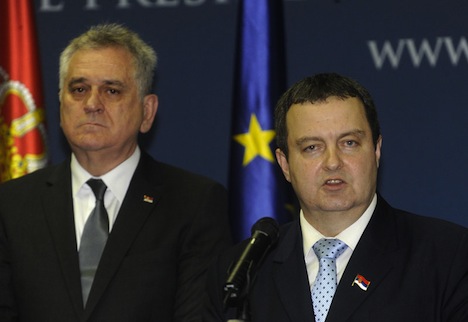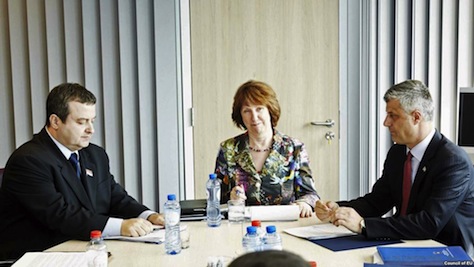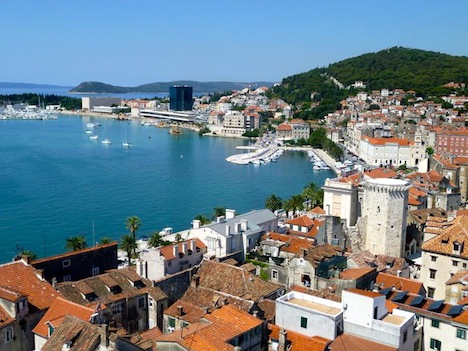
As Serbia takes another step closer to joining the European Union, its government is headed to snap elections on March 16, with the Serbian Progressive Party (SNS, Српска напредна странка) of president Tomislav Nikolić hoping to replace prime minister Ivica Dačić with its own leader, Aleksandar Vučić, after just 18 months since Dačić took office. 
Dačić and his Socialist Party of Serbia (SPS, Социјалистичка партија Србије) emerged in the May 2012 parliamentary elections as the surprisingly strong third-place winners. That gave Dačić and the SPS the power to determine whether the new government would comprise an alliance with Nikolić’s center-right Progressives or the center-left Democratic Party (DS, Демократска странка) of former president Boris Tadić. Nikolić, on his fifth attempt to win the presidency, edged out Tadić in the May 2012 presidential runoff, bringing Tadić’s eight-year tenure to an end.
As the kingmaker for Serbia’s next government, Dačić (pictured above, right, with Nikolić, left) decided to crown himself king — and Dačić became prime minister, though his Socialists, with 44 seats in Serbia’s 250-member National Assembly (Народна скупштина), were technically the junior partner in coalition with the Progressives, which hold 73 seats. (The Democrats currently hold 67, and three more minor parties each hold between 16 and 21 seats).
The Dačić-led government oversaw an economic recovery — a 1.7% contraction in 2012 transformed into an estimated 2.4% expansion in 2013. In any event, there’s no doubt that the Serbian economy has marked a definite improvement. Though unemployment remains high at around 20%, it’s fallen from a high of around 25.5% in early 2012.
Moreover, Serbia achieved significant progress on EU membership, with negotiations opening earlier this month and ongoing EU-brokered negotiations on the fragile relationship over the future status of Kosovo, despite concerns in 2012 that Nikolić and the Progressives have historically been closer to Russia than to western Europe and wary of EU accession. The EU talks will rank among the top issues in the election campaign, including the reform program that Brussels requires as a prelude to membership, which could significantly boost the Serbian economy.
But a year and a half into government, Nikolić and the Progressives believe the time has come for Vučić to assume the premiership — and polls show that Serbians agree. With a fresh mandate, Vučić will push forward with the EU negotiations, and there’s a chance that a new Progressive-led administration work with the IMF for a package of guarantees to reduce lending costs.
A Faktor poll last week showed that 42.1% of Serbia’s electorate support the Progressives, while just 13.9% support the Democrats and 10.5% support Dačić’s Socialists. Two other parties achieve significant support: the eurosceptic, conservative Democratic Party of Serbia (DSS, Демократска странка Србије), led by Vojislav Koštunica, Serbia’s president from 2000 to 2003 and prime minister from 2004 and 2008, would win 6.8%; and the free-market liberal, centrist Liberal Democratic Party (LDP, Либерално-демократска партија), led by Čedomir Jovanović and several former Democratic Party members, would win 5%.
Vučić, who became the leader of the Progressive Party in May 2012, serves as the first deputy prime minister, and from July 2012 to August 2013, he also served as Serbia’s defense minister. As the head of the largest party in government, however, he holds more de facto power that Dačić. As the Progressive Party leader, he’s taken a strong stance against corruption, and he has played a central role in negotiations with respect to Serbia’s accession to the European Union. As a member of the once-dominant Serbian Radical Party, Vučić served as minister of information in the late 1990s, when at the young age of age 28, he was responsible for assessing fines against journalists who criticised the government and Serbian president Slobodan Milošević — a stance he has recanted today. Continue reading Serbian government pushes forward with early elections →

![]()
![]()
![]()


